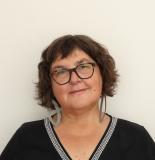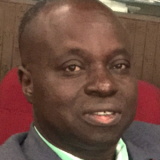Alison Gillwald (PhD) is the Executive Director of Research ICT Africa (RIA) an African digital policy and regulatory think-tank that works across 20 African countries. She is also adjunct- professor at the University of Cape Town’s Nelson Mandela School of Public Governance where she supervises doctoral students undertaking transdisciplinary research in digital policy regulation and data governance. A former regulator she was appointed to the founding Council of the South African Telecommunications Regulatory Authority (SATRA) in 1997, having headed the policy department at the first broadcasting regulator, the Independent Broadcasting Authority established in 1994. She has advised the South African Presidency, the National Planning Commission, the Competition Commission and the Independent Communications Authority of South Africa, in addition to the African Union Commission, SADC, CRASA and the SADC Parliamentary Forum. She has been commissioned by the International Telecommunications Union, the World Bank and the African Development Bank to undertake research to inform policy across a number of Africa countries and collaborates with networks across the Global South to build evidence base for decision-makers. She is the deputy chairperson of Giganet, the international academic internet governance conference and was an inaugural associate editor of the ITU journal, Discoveries.
Faculty and resource persons AfriSIG 2015
Alison Gillwald

Anriette Esterhuysen

Anriette Esterhuysen was the executive director of the Association for Progressive Communications (APC) - the largest ICT-focused civil society network in the world - from 2000 to 2017. She continues to work with APC as a consultant and convenes the African School on Internet Governance (AfriSIG), a joint initiative of APC, the African Union Commission and Research ICT Africa.
Ms. Esterhuysen has served as Chair of the Multistakeholder Advisory Committee of the United Nations Internet Governance Forum. as well as on the African Technical Advisory Committee of the United Nations Economic Commission for Africa's African Information Society Initiative (1996-1999), the United Nations ICT Task Force (2002-2005), the World Summit on the Information Society (WSIS) Working Group on Financing Mechanisms (2003-2005), the Commission on Science and Technology for Development Working Group on Internet Governance Forum (IGF) Improvements (2011-2012) and on Enhanced Cooperation (2017-2018), the Global Commission on Internet Governance and the Multistakeholder Advisory Group (MAG) of the IGF (2012-2014).
She was inducted into the Internet Hall of Fame as a Global Connecter in 2013 and received an EFF Pioneer Award in 2015. Ms. Esterhuysen serves as a Commissioner on the Global Commission on the Stability of Cyberspace and as a member of the board of directors of the .ZA (South Africa) domain name authority, ZADNA.
David Souter

As the Managing Director of ICT Development Associates, David provides expertise concerning ICTs, Internet governance and their relationship with public policy, particularly development, environment, governance, rights and conflict. He was lead consultant for the UN Commission on Science and Technology’s five and ten year reviews of WSIS outcomes, and has worked extensively for UNESCO, UNCTAD, ITU and other UN agencies, for international development agencies including the African Development Bank, and for non-governmental organisations including APC and the Internet Society. He was Visiting Professor in Communications Management at Strathclyde University and, until September this year, Visiting Senior Fellow in Media and Communications at the London School of Economics. David lives in the United Kingdom.
Dawit Bekele

Dr. Dawit Bekele is the Regional Vice President-Africa of the Internet Society, an organization that works for an open, globally connected and secure Internet for everyone.He is an Ethiopian citizen living in Addis Ababa. He received undergraduate, Masters and Ph.D. degrees from Université Paul Sabatier in France, all degrees in Computer Science. He also holds a master’s in business leadership from University of South Africa. Prior to joining Internet Society, Dr. Dawit worked at Addis Ababa University on teaching and research positions in computer science. He also started and ran a private company forIn ternet-related services for a number of years.
Edmund Katiti
Dr. Edmund Katiti was the Head of the New Partnership for Africa’s Development (NEPAD). In November 2005 Dr. Katiti joined NEPAD as Policy and Regulatory Advisor, in which capacity he coordinated the development of policy and regulatory frameworks for NEPAD ICT infrastructure programmes and projects. As ICT Coordinator for NEPAD Agency, Dr. Katiti was responsible for regional and continental ICT programmes and projects through stakeholder meetings for consensus-building workshops and conducting studies related to the sector. In 2006, Dr. Katiti developed and implemented the Kigali Protocol (2006), a policy and regulatory framework to accelerate development of ICT broadband infrastructure in Africa. Dr Katiti is involved with regional and international ICT and internet governance organisation’s that include the Internet Corporation for Assigned Names and Numbers (ICANN), the International Telecommunications Union (ITU), the Internet Governance Forum (IGF) and the Electrical and Electronics Engineers (IEEE).
Emilar Vushe

Emilar Vushe works with the Association for Progressive Communications (APC), and has been since 2009, where she is responsible for coordinating policy projects in Africa. Prior to joining APC, she worked as a researcher both in Zimbabwe and South Africa mainly focusing on public information rights and human rights. She is a graduate of the National University of Science and Technology (NUST) in Zimbabwe.
Janine Moolman
Jan Moolman is a feminist editor, writer, trainer and activist with extensive experience in the South and Southern African women’s rights sector. Her entry point into women’s rights has been through media: she is a former editor of Agenda, South Africa’s longest surviving feminist journal, a newspaper columnist, and has contributed to a number of publications dealing with women’s rights issues. Previously, Jan guest edited an Agenda journal edition on technology with a team from Women’sNet, where she worked as the Media and Information Manager. Women’sNet is a Southern African organisation that promotes the strategic use of ICTs amongst women, girls and marginalised groups for social action. Through her work at the Southern African NGO Network (SANGONeT), Jan conducted training and capacity building for South African NGOs in the use of social media to deepen and support their work and managed an information portal. Jan works in APC’s Women’s Rights Programme (WRP) as the global women’s rights policy lead. She is also a digital storytelling trainer and is currently working towards a Master’s degree in Media Studies.
Lars-Erik Forsberg
He is the Deputy head in the international cooperation unit of the Directorate General for Communication Networks, Content and Technology (DG CONNECT). He joined the European Union integration directorate of the Ministry in 1993. In 1995, he started to work for the European Commission first for 3 years in the Internal Market Directorate General and then from 1999-2012 in the Directorate general for Enlargement, responsible for the negotiations of the chapter on Capital Movements and later deputy head of the Serbia unit in DG Enlargement.
Makane Faye

Mr. Makane Faye is a retiree from the United Nations Economic Commission for Africa (UNECA) and has close to 40 years of experience in information management and ICT for development issues, including Internet Governance. He has served in various stations including at the Ministry of Education and the Ministry of Research of Senegal, the African Regional Organization for Standardization in Kenya and UNECA in Ethiopia. He occupied at this last duty station from 1990 to 2016 the functions of respectively, Information Development Officer, Regional Advisor in Information Systems Development, Senior Regional Advisor in ICT Policy, Manager of the Information Technology Centre for Africa, Chief of e-Application Section and Chief of Knowledge Services Section.
He worked both at the technical and policy levels as a trainer and advisor in the development and implementation of ICT policies in African countries and promotion of regional cooperation in the framework of the African Information Society Initiative (AISI) and NEPAD. He led high-level advisory missions and coordinated common positions during the World Summit on the Information Society (WSIS) process as Secretary to the African Ministerial Committee and the Internet Governance Forums at global, continental and regional levels. He was at the same time from 2008 up to his retirement, President of the UNECA Staff Union and Chairperson of the Federation of United Nations Staff Union to lead staff-management negotiations at both local and global UN levels.
He serves currently on a voluntary basis as:
- Secretary of the African Internet Governance Forum (www.afigf.africa), African Union.
- Chairperson, Scientific Committee, West African Internet Governance Forum (http://www.waigf.org) ECOWAS.
- Member of the Executive Committee, Internet Governance Forum Support Association (www.igfsa.org)
- President, Association of former United Nations Staff in Senegal (www.asafi.sn).
Mr Faye holds degrees in Geography and Documentation Sciences, a Master in Management of Information Systems and a PhD in Information Technology.
Mawaki Chango

Mawaki is a scholar as well as a consultant and an entrepreneur in the field of Information and Communication Technology (ICT). He is particularly enthusiastic about assisting African countries build the fundamentals for a truly digital economy through inclusive and evidence-based ICT-enabling policies. He has nearly 20 years of experience on societal issues relating to ICTs, consulting for organizations including UNESCO, the International Development Research Center, the Open Society Foundations, the African Union’s NEPAD Agency, UN’s Economic Commission for Africa, Hivos, the Association for Progressive Communications (APC), etc. Mawaki earned a PhD in Information Science and Technology from Syracuse University (Syracuse, New York) with a research focus on Internet governance, policy and digital identity management. He is a founding member of the Board of Trustees at Sovrin Foundation which has been set up to govern a global public utility for decentralized identity provided via Sovrin Network, and is dedicated to building a trustworthy identity layer to the Internet protocols. Over the last dozen of years, Mawaki has been actively involved in internet governance spaces such as the Internet Corporation for Assigned Names and Numbers (ICANN), particularly as a Policy Councillor in matters the Internet’s generic top-level domain names; the global civil society’s Internet Governance Caucus; and the UN-led process, Internet Governance Forum, both at global level and on various levels in Africa. Founder of DigiLexis Consulting, Dr. Chango intends to increasingly engage his thoughts and actions to help spur Internet-enabled entrepreneurial opportunities in Africa as well as governments to embrace the most adequate policies in that regard while improving their own operations in the digital age. Currently residing in Togo where he lectures at Kara University, Mawaki speaks English, French and Portuguese.
Pria Chetty

In her current position as the Regional Director of EndCode, she manages a team of advisors that consult developments in technology law and policy to advise clients including tech multinationals, tech start-ups, governmental and non-governmental organisations. She has an entrepreneurial nature on the one hand, excited by the challenge to develop and give life to new programmes, organisations and institutional capabilities; and a respect for governance and excellence on the other hand, with an eye for detail and responsible programme delivery within professional standards. She's an advocate for the potential of emerging technology to improve the lives of Africans and has made it her life’s work to contribute to game-changing initiatives. She's married to her best friend, whom he calls the Great Heart and they have two little boys, one loves reptiles and one loves Harry Potter.
Towela Nyirenda-Jere

Dr. Towela Nyirenda Jere holds a PhD in Electrical Engineering (Networking and Telecommunications) from the University of Kansas, an ACCA Diploma in Financial Management and is a qualified Project Management Professional (PMP) with the Project Management Institute (USA). She is currently the Programmes Manager with the NEPAD e-Africa Programme at the NEPAD Planning and Coordinating Agency (NPCA). She currently manages projects in e-skills and Internet Governance and is responsible for identification of new projects and partnerships for the e-Africa Programme. Prior to this appointment she was the Projects Coordinator at the Malawi Polytechnic, University of Malawi.
